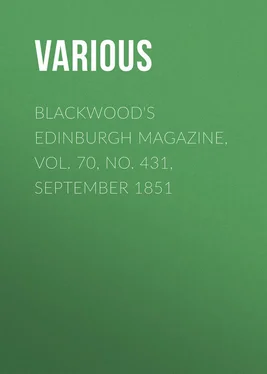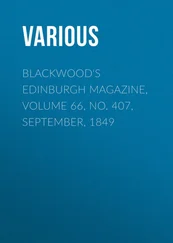Various - Blackwood's Edinburgh Magazine, Vol. 70, No. 431, September 1851
Здесь есть возможность читать онлайн «Various - Blackwood's Edinburgh Magazine, Vol. 70, No. 431, September 1851» — ознакомительный отрывок электронной книги совершенно бесплатно, а после прочтения отрывка купить полную версию. В некоторых случаях можно слушать аудио, скачать через торрент в формате fb2 и присутствует краткое содержание. Издательство: Иностранный паблик, Жанр: periodic, foreign_edu, Путешествия и география, на английском языке. Описание произведения, (предисловие) а так же отзывы посетителей доступны на портале библиотеки ЛибКат.
- Название:Blackwood's Edinburgh Magazine, Vol. 70, No. 431, September 1851
- Автор:
- Издательство:Иностранный паблик
- Жанр:
- Год:неизвестен
- ISBN:нет данных
- Рейтинг книги:3 / 5. Голосов: 1
-
Избранное:Добавить в избранное
- Отзывы:
-
Ваша оценка:
- 60
- 1
- 2
- 3
- 4
- 5
Blackwood's Edinburgh Magazine, Vol. 70, No. 431, September 1851: краткое содержание, описание и аннотация
Предлагаем к чтению аннотацию, описание, краткое содержание или предисловие (зависит от того, что написал сам автор книги «Blackwood's Edinburgh Magazine, Vol. 70, No. 431, September 1851»). Если вы не нашли необходимую информацию о книге — напишите в комментариях, мы постараемся отыскать её.
Blackwood's Edinburgh Magazine, Vol. 70, No. 431, September 1851 — читать онлайн ознакомительный отрывок
Ниже представлен текст книги, разбитый по страницам. Система сохранения места последней прочитанной страницы, позволяет с удобством читать онлайн бесплатно книгу «Blackwood's Edinburgh Magazine, Vol. 70, No. 431, September 1851», без необходимости каждый раз заново искать на чём Вы остановились. Поставьте закладку, и сможете в любой момент перейти на страницу, на которой закончили чтение.
Интервал:
Закладка:
The most renowned chief of the mutinous tribes of Taka, the conqueror of the Turks under Churdschid Bascha, was Mohammed Din, Grand-Schech of the Haddenda. This personage, awed by the approach of Achmet's formidable force, sent his son to the advancing Bascha, as a hostage for his loyalty and submission. Achmet sent the young man back to his father as bearer of his commands. The next day the army crossed the frontier of Taka, which is not very exactly defined, left the Atbara in their rear, and, moving still eastwards, beheld before them, in the far distance, the blue mountains of Abyssinia. The Bascha's suite was now swelled by the arrival of numerous Schechs, great and small, with their esquires and attendants. The route lay through a thick forest, interwoven with creeping plants and underwood, and with thorny mimosas, which grew to a great height. The path was narrow, the confusion of the march inconceivably great and perilous, and if the enemy had made a vigorous attack with their javelins, which they are skilled in throwing, the army must have endured great loss, with scarcely a possibility of inflicting any. At last the scattered column reached an open space, covered with grass, and intersected with deep narrow rills of water. The Bascha, who had outstripped his troops, was comfortably encamped, heedless of their fate, whilst they continued for a long time to emerge in broken parties from the wood. Mr Werne's good opinion of his generalship had been already much impaired, and this example of true Turkish indolence, and of the absence of any sort of military dispositions under such critical circumstances, completely destroyed it. The next day there was some appearance of establishing camp-guards, and of taking due precautions against the fierce and numerous foe, who on former occasions had thrice defeated Turkish armies, and from whom an attack might at any moment be expected. In the afternoon an alarm was given; the Bascha, a good soldier, although a bad general, was in the saddle in an instant, and gallopping to the spot, followed by all his cavalry, whilst the infantry rushed confusedly in the same direction. The uproar had arisen, however, not from Arab assailants, but from some soldiers who had discovered extensive corn magazines — silos , as they are called in Algeria – holes in the ground, filled with grain, and carefully covered over. By the Bascha's permission, the soldiers helped themselves from these abundant granaries, and thus the army found itself provided with corn for the next two months. In the course of the disorderly distribution, or rather scramble, occurred a little fight between the Schaïgië, a quarrelsome set of irregulars, and some of the Turks. Nothing could be worse than the discipline of Achmet's host. The Schaïgiës were active and daring horsemen, and were the first to draw blood in the campaign, in a skirmish upon the following day with some ambushed Arabs. The neighbouring woods swarmed with these javelin-bearing gentry, although they lay close, and rarely showed themselves, save when they could inflict injury at small risk. Mr Werne began to doubt the possibility of any extensive or effectual operations against these wild and wandering tribes, who, on the approach of the army, loaded their goods on camels, and fled into the Chaaba , or forest district, whither it was impossible to follow them. Where was the Bascha to find money and food for the support of his numerous army? – where was he to quarter it during the dangerous Chariff , or rainy season? He was very reserved as to his plans; probably, according to Mr Werne, because he had none. The Schechs who had joined and marched with him could hardly be depended upon, when it was borne in mind that they, formerly the independent rulers of a free people, had been despoiled of their power and privileges, and were now the ill-used vassals of the haughty and stupid Turks, who overwhelmed them with imposts, treated them contemptuously, and even subjected them to the bastinado. "Mohammed Din, seeing the hard lot of these gentlemen, seems disposed to preserve his freedom as long as possible, or to sell it as dearly as may be. Should it come to a war, there is, upon our side, a total want of efficient leaders, at any rate if we except the Bascha. Abdin Aga, chief of the Turkish cavalry, a bloated Arnaut; Sorop Effendi, a model of stupidity and covetousness; Hassan Effendi Bimbaschi, a quiet sot; Soliman Aga, greedy, and without the slightest education of any kind; Hassan Effendi of Sennaar, a Turk in the true sense of the word (these four are infantry commanders); Mohammed Ladjam, a good-natured but inexperienced fellow, chief of the Mograbin cavalry: amongst all these officers, the only difference is, that each is more ignorant than his neighbour. With such leaders, what can be expected from an army that, for the most part, knows no discipline – the Schaïgiës, for instance, doing just what they please, and being in a fair way to corrupt all the rest – and that is encumbered with an endless train of dangerous rabble, idlers, slaves, and women of pleasure, serving as a burthen and hindrance? Let us console ourselves with the Allah kerim! (God is merciful.)" Mr Werne had not long to wait for a specimen of Turkish military skill. On the night of the 7th April he was watching in his tent beside his grievously sick brother, when there suddenly arose an uproar in the camp, followed by firing. "I remained by our tent, for my brother was scarcely able to stir, and the infantry also remained quiet, trusting to their mounted comrades. But when I saw Bimbaschi Hassan Effendi lead a company past us, and madly begin to fire over the powder-waggons, as if these were meant to serve as barricades against the hostile lances, I ran up to him with my sabre drawn, and threatened him with the Bascha, as well as with the weapon, whereupon he came to his senses, and begged me not to betray him. The whole proved to be mere noise, but the harassed Bascha was again up and active. He seemed to make no use of his aides-de-camp, and only his own presence could inspire his troops with courage. Some of the enemy were killed, and there were many tracks of blood leading into the wood, although the firing had been at random in the darkness. As a specimen of the tactics of our Napoleon-worshipping Bascha, he allowed the wells, which were at two hundred yards from camp, to remain unguarded at night, so that they might easily have been filled up by the enemy. Truly fortunate was it that there were no great stones in the neighbourhood to choke them up, for we were totally without implements wherewith to have cleared them out again." Luckily for this most careless general and helpless army, the Arabs neglected to profit by their shortcomings, and on the 14th April, after many negotiations, the renowned Mohammed Din himself, awed, we must suppose, by the numerical strength of Achmet's troops, and over-estimating their real value, committed the fatal blunder of presenting himself in the Turkish camp. Great was the curiosity to see this redoubted chief, who alighted at Schech Defalla's tent, into which the soldiers impudently crowded, to get a view of the man before whom many of them had formerly trembled and fled. "Mohammed Din is of middle stature, and of a black-brown colour, like all his people; his countenance at first says little, but, on longer inspection, its expression is one of great cunning; his bald head is bare; his dress Arabian, with drawers of a fiery red colour. His retinue consists, without exception, of most ill-looking fellows, on whose countenances Nature seems to have done her best to express the faithless character attributed to the Haddenda. They are all above the middle height, and armed with shields and lances, or swords." Next morning Mr Werne saw the Bascha seated on his angarèb , (a sort of bedstead, composed of plaited strips of camel-hide, which, upon the march, served as a throne,) with a number of Shechs squatted upon the ground on either side of him, amongst them Mohammed Din, looking humbled, and as if half-repentant of his rash step. The Bascha appeared disposed to let him feel that he was now no better than a caged lion, whose claws the captor can cut at will. He showed him, however, marks of favour, gave him a red shawl for a turban, and a purple mantle with gold tassels, but no sabre, which Mr Werne thought a bad omen. The Schech was suffered to go to and fro between the camp and his own people, but under certain control – now with an escort of Schaïgiës, then leaving his son as hostage. He sent in some cattle and sheep as a present, and promised to bring the tribute due; this he failed to do, and a time was fixed to him and the other Shechs within which to pay up arrears. Notwithstanding the subjection of their chief, the Arabs continued their predatory practices, stealing camels from the camp, or taking them by force from the grooms who drove them out to pasture.
Читать дальшеИнтервал:
Закладка:
Похожие книги на «Blackwood's Edinburgh Magazine, Vol. 70, No. 431, September 1851»
Представляем Вашему вниманию похожие книги на «Blackwood's Edinburgh Magazine, Vol. 70, No. 431, September 1851» списком для выбора. Мы отобрали схожую по названию и смыслу литературу в надежде предоставить читателям больше вариантов отыскать новые, интересные, ещё непрочитанные произведения.
Обсуждение, отзывы о книге «Blackwood's Edinburgh Magazine, Vol. 70, No. 431, September 1851» и просто собственные мнения читателей. Оставьте ваши комментарии, напишите, что Вы думаете о произведении, его смысле или главных героях. Укажите что конкретно понравилось, а что нет, и почему Вы так считаете.












